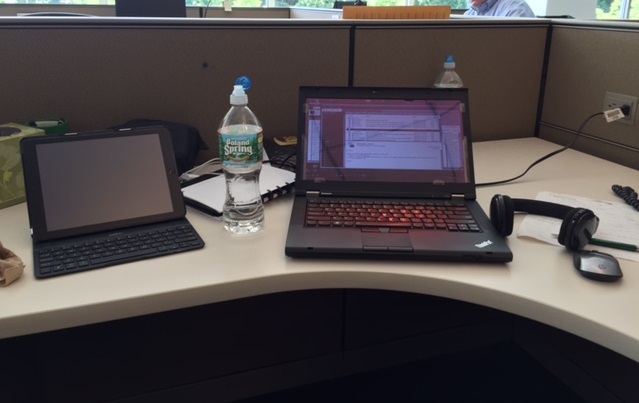From conference rooms to conference calls, from our homey desk at the office to a hotel room across the world, people are working “on the go” in various ways. Mobile devices make many of these forms of mobile work possible. From the early days of the personal laptop, to the revolutionary Blackberrys and PDAs, to today’s smart phones, tablets, and wearables, our work tools are rapidly changing, and enterprises must quickly adapt new solutions to keep up with our constant mobile demands. At IBM, the importance of mobile enterprise solutions is on everyone’s mind. As we tackle the demands of the enterprise on the go, we are using ethnographic insights to further and deepen our understandings of what “mobile work” means today.
Consider Sally*, a tech consultant. She uses her phone to join a conference call with her team while driving to a client site in the morning. At the client site, she presents slides from her laptop and uses her phone to demo solutions. In the afternoon, she is back at the desk in her home office, where her phone doubles as a monitoring device, giving audible email and chat alerts while her laptop is dedicated to the larger spreadsheets that will go into a report for a different client. Later, she’ll hop on the treadmill in her basement, where she’ll use chat and messaging to stay connected with her team while “away” from her desk, as they prep for an international client site visit the following day. Her day ends with an overnight flight to that client site, where she’ll sneak in a few hours of work before getting some sleep, using her phone in offline mode to clean up her inbox and queue up email drafts to send out once she lands.

An image from the photo diary of a study participant working at a temporary desk at a client site, with laptop and tablet handy.
From customized storage and cloud computing solutions, to mobile-compatible programs, IBM is taking the challenge of the mobile enterprise to heart. One particular initiative is groundbreaking for the tech titans it brings together: IBM’s partnership with Apple. Launched last year, this ambitious partnership has IBMers working alongside Apple designers to create 100 new mobile apps dedicated to the unique challenges of the enterprise user.
Meeting the demands of the mobile enterprise market is not simply a question of making mobile-friendly versions of enterprise systems, though translating existing programs into the modern look and feel that mobile app users have come to expect is important. The bigger challenge of designing mobile enterprise apps is to develop born-mobile solutions that not only transform the form and function of enterprise systems, but also expand the capabilities of these systems by taking advantage of the unique features of mobile devices. At IBM, another key objective is designing solutions that integrate Watson analytics, enabling apps to offer unique, personalized experiences as they learn from users over time.
As we all know, designing technologies is not just a technical endeavor. It also involves extensive and intimate understanding of people and the complicated ways “context” shapes the meanings and impacts of technologies on our lives. In the enterprise, apps need to have not only the look and feel of modern technology solutions, but also the flexibility to be easily integrated into existing workflows. This is where ethnographic inquiry comes in.
This summer, Jeanette Blomberg and I began an ethnographic project at IBM Research looking at mobile work practices. We were inspired by IBM’s recent partnership with Apple, as well as our own experiences of mobility and working on the go. Smart phones and tablets have proliferated and mobililty is a ubiquitous experience of contemporary work. Yet little research has explored connections between these contemporary experiences and broader histories of mobility and movement as a social experience in anthropological, sociological, and organizational traditions. Mobile devices are both supporting long-established work routines and practices and, at the same time, transforming them. Jeanette and I set out to explore what these forms of workplace movement mean for the design of enterprise apps and for the nature of contemporary work more broadly.
To do this, we began by talking with and observing product teams—those designing and selling specific enterprise applications—to understand how IBM’s business units are currently responding to market trends and their visions for how these needs might evolve. This gave us an eye into the business strategies behind these products as well as a sense of the on-the-ground lens these teams have into industries via their clients. Members of product teams have important insights, as they have been thinking about and deeply engaged with particular products day in and day out for months, sometimes years. Tapping into these insights is allowing us to get a sense of the broader market pulse.
We are also talking with workers themselves to understand their everyday work practices and how they interact with colleagues, spanning multiple locations, devices and apps into these practices. We discuss particular mobile apps as well as broader experiences beyond specific apps or programs. Our focus is on work practices, which often include interactions across devices, exceeding use of any one singular app. Over the course of a few hours, a worker might move between laptop and smart phone, landline and soft phone, laptop and tablet. Beyond these multi-device interactions, a worker also will have “micro-movements” as they move between apps on a single device in their efforts to get work done.
Moving across interactional contexts and devices is what enables workers to configure technological assemblages that can meet the demands of their changing sociomaterial contexts as they work on the go. But this flexibility poses a challenge for designers to understand and model how work “moves” within and across devices. Understanding these movements is key to designing interoperability between apps. It is also vital to mapping data traces and developing data analytics that are able to leverage these forms of mobility, allowing enterprise apps to learn from the activities of workers across contexts.
Our focus is on the practices and situated actions that comprise mobile work. Our inquiry leads with the people, their activities, and their ideas. This allows us to understand how technologies are brought into everyday work practices, how they acquire meanings, and how those meanings evolve over time. Technologies in this sense are part of the broader constellation of practices, which comprises systems and apps, but also people, habits, preferences, personal and organizational constraints, and other everyday demands.
Our work supports the efforts of IBM’s product teams in at least two ways. First, our study of mobile work practices allows us to see how various factors are assembled through practice—people, policies, spaces, devices, apps, and so on. Extending our focus beyond one user and one app, we gain understandings of how people engage multiple devices and apps over the course of their workdays. We situate these micro-practices within broader technological, geographic, and organizational locations, allowing us to add nuance and depth to our product-focused use cases, and enriching our perspectives on what “user experience” means in dynamic, multimodal mobile situations. Second, our focus on practices supports the product teams by identifying new opportunities for processes where data analytics could provide added value for workers by making these micro-movements smoother, more streamlined, and ultimately “smart.” By working closely with designers, developers, and workers, we are striving to derive and render actionable our ethnographic insights that explore the complicated and sometimes messy quality of mobile work in practice.
*Sally is a pseudonym. This vignette is based on interview data.


0 Comments